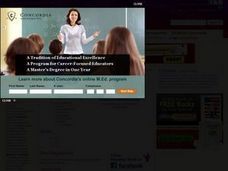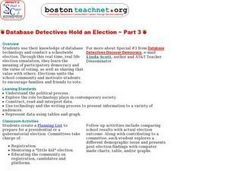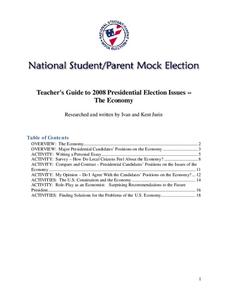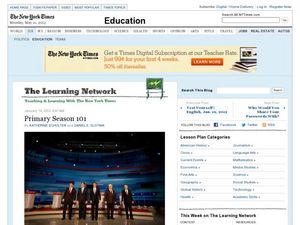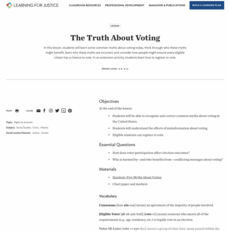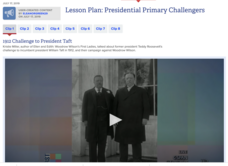Curated OER
Growing Voters and Election 2004: Classroom Debate
Young scholars research the issues and platforms of candidates and separate propaganda from process in order to choose a candidate to support. Students examine political parties and their contributions to shaping the foundation of the...
Curated OER
Primary Process in Elections
Students read "How Does the Primary Process Work" and complete the accompanying worksheet. They explore how the primary and caucus process works in small groups or in pairs. They answer questions based on the primary process to...
Curated OER
Analyzing Free and Fair Elections
Students brainstorm the qualities of a "free and fair" elections. They read background information pertaining to the upcoming 2007 presidential elections. Pupils compare the "free and fair" elections list composed by students to the...
Curated OER
Database Detectives Hold an Election ~ Part 3
Students use a database to conduct a schoolwide election. They discover the importance of voting and democracy. They incourage one another to vote.
Curated OER
Evaluation of Election Process
Students examine the procedures to elect the President of the United States. In groups, they create their own political cartoon presenting a consensus of their point of views on the process. They identify the strengths and weaknesses...
Curated OER
Teacher's Guide to 2008 Presidential Election Issues: The Economy
Students discuss the 2008 Presidential election. They examine the significant issues of the election and focus on the economy. Students study the major issues with the economy. Students decide how they feel about each canidates' views...
Curated OER
Elections for Elementary Students
Students explore various websites that explain how primaries, caucuses, and general elections function. They view sample ballots, and analyze the executive branch, U.S. presidents, and citizenship.
Curated OER
The 2004 Presidential Election
Young scholars examine the 2004 Presidential election between George W. Bush and John Kerry. Using a variety of primary source documents, they discover where the candidates stood on the issues. In groups, they create a tableau in which...
Curated OER
Election Results Map
Students use election night returns to create a map of the results. They can represent popular vote results or electoral votes received. They use the internet to gather information about the electoral college and results.
Curated OER
Building a Class Government Through Elections
Young scholars participate in their own classroom election to fill multiple positions. Individually, they examine campaign speeches and write their own. Once the election occurs, they must fulfill their duties as outlined in their...
Curated OER
Cartoons for the Classroom: Free vs. Phony Elections
In this current events worksheet, students analyze a political cartoon about free elections and respond to 3 talking point questions.
Curated OER
Cartoons for the Classroom: Between the Lines, 2010 Midterm Elections
In this current events worksheet, students analyze a political cartoon about the 2010 Midterm Elections and respond to 3 talking point questions.
Curated OER
Cartoons for the Classroom: 2004 Presidential Election
In this current events activity, students analyze a political cartoon about the 2004 election and respond to 5 short answer questions.
C-SPAN
Should States Shift to Mail-In Voting during the Coronavirus Pandemic?
With the coronavirus pausing many norms in American society, officials are trying to decide how to safely hold voting in the 2020 presidential election. Using curated video clips, including speeches from Congress, journalists, and...
Curated OER
How Laws Are Made
Students create a graphic organizer to illustrate the steps elected representatives must take to make a new law. Included: Student work sheet and role-play ideas. Students use their graphic organizers to write a paragraph briefly...
Curated OER
Primary Season 101
While this New York Times resource posted several months ago it could still be a useful learning experience. Learners practice using the Times's Campaign 2012 Politics section to help them answer 16 questions about the Republican...
iCivics
Win the White House
Here is a unique and engaging approach to learning about the steps a presidential candidate must take during a campaign. Learners role play the part of a candidate in this online interactive, taking part in a presidential debate and then...
Teaching Tolerance
The Truth About Voting
True or False: Only Presidential elections matter. Academics delve into common voting myths to understand what is true and why the election process is critical to democracy. The lesson uses group discussion, activities, and handouts to...
Curated OER
What Are the Important Issues?
Students determine the most important issue of the current campaign. They follow a multi-step voting process to determine the most important issue(s) of the current campaign. They document the final vote on five important issues by...
Curated OER
Pass This Jobs Bill
It seems that print media is slowly being replaced by electronic versions. Get your kids reading the New York Times e-style. They'll read the provided article entitled, "Pass This Jobs Bill" then answer six comprehension questions. Two...
C-SPAN
Presidential Primary Challengers
A formidable opponent can shake up the election of an incumbent president. Class members explore the results of the elections of 1912, 1968, 1976, 1980 and 1992 using video clips. A chart helps pupils organize their thoughts and analysis.
iCivics
Campaign Cash: Money Talks!
Money talks! And it can reveal a lot about political candidates. An 11-slide presentation examines how candidates raise and spend money on an election. The slides, using data from the 2016 Presidential election, reveal how much it costs...
Curated OER
Campaign Ad Critique
Learners analyze current campaign TV ads and literature. They identify the ad by "type." They learn to look beyond the ad to understand its intended purposes and its real content.
Carolina K-12
Minnesota v. White: Exploring a Judicial Candidate’s First Amendment Rights
After watching a documentary on the Supreme Court case Republican Party of Minnesota v. White, class members research how the First Amendment and free speech issues influence judicial elections and then conduct a mock judicial election.
Other popular searches
- Election Day
- Presidential Elections
- Election Day for Kids
- 2008 Presidential Election
- Voting and Elections
- Election of 1860
- Election 2008
- 2nd Grade Election Day
- Mock Election
- Election Day Activities K 3
- Abraham Lincoln Election
- 2008 Elections



